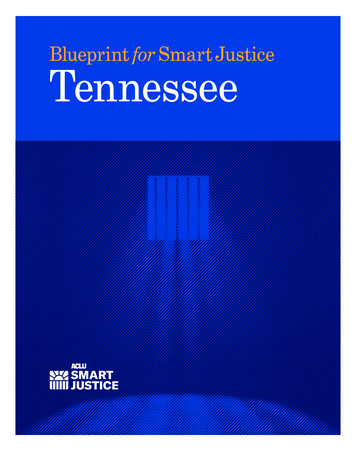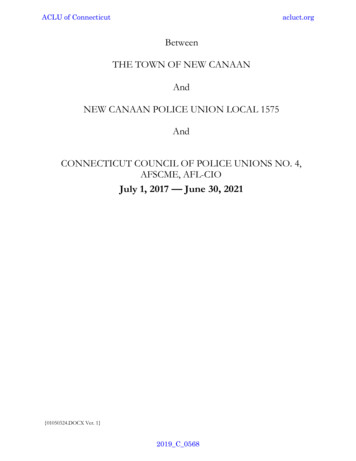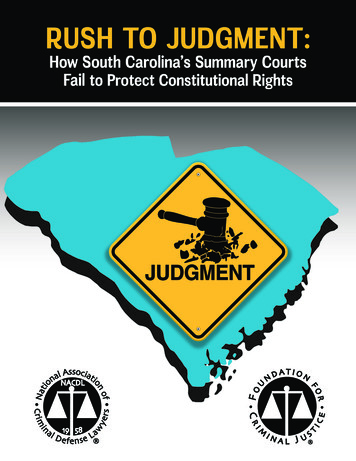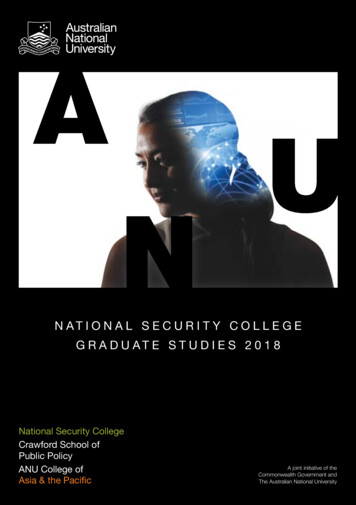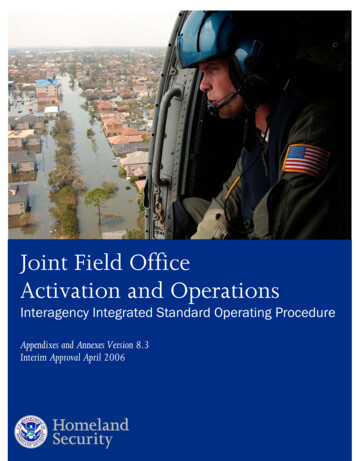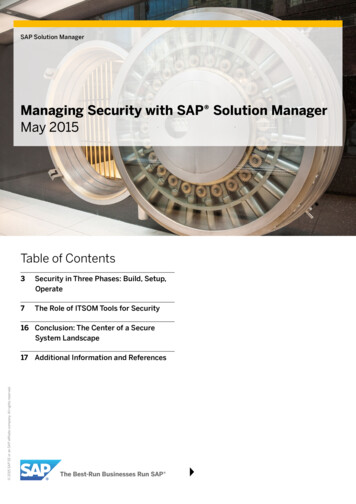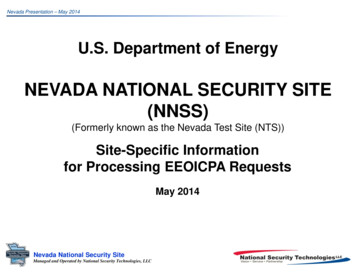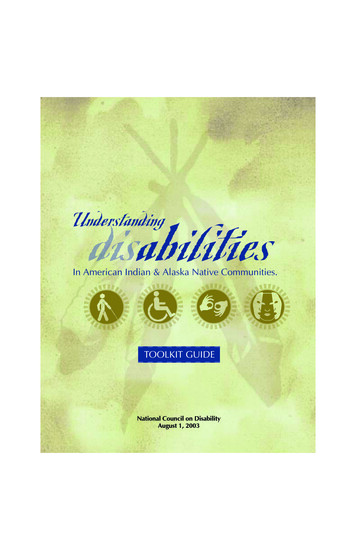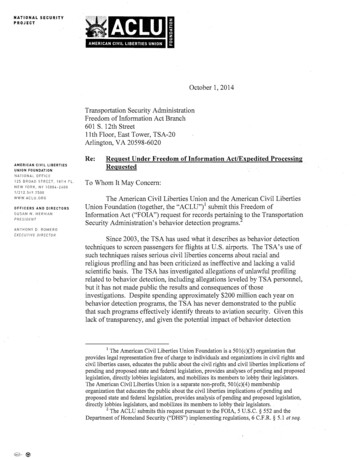
Transcription
NATIONAL SECURITYPROJECTACLUAMERICAN CIVIL LIBERTIES UNIONIOctober 1, 2014Transportation Security AdministrationFreedom of Information Act Branch601 S. 12th Street11th Floor, East Tower, TSA-20Arlington, VA 20598-6020Re:AMERICAN CIVIL LIBERTIESUNION FOUNDATIONRequest Under Freedom of Information Act/Expedited Processing .RequestedNATIONAL OFFICE125 BROAD STREET, 18TH FL.NEW YORK, NY 10004-2400To Whom It May Concern:T/212.549.2500WWW.ACLU.ORGOFFICERS AND DIRECTORSSUSAN N. HERMANPRESIDENTThe American Civil Liberties Union and the American Civil LibertiesUnion Foundation (together, the "ACLU") 1 submit this Freedom ofInformation Act ("FOIA") request for records pertainin to the TransportationSecurity Administration's behavior detection programs.ANTHONY D. ROMEROEXECUTIVE DIRECTORSince 2003, the TSA has used what it describes as behavior detectiontechniques to screen passengers for flights at U.S. airports. The TSA's use ofsuch techniques raises serious civil liberties concerns about racial andreligious profiling and has been criticized as ineffective and lacking a validscientific basis. The TSA has investigated allegations of unlawful profilingrelated to behavior detection, including allegations leveled by TSA personnel,but it has not made public the results and consequences ofthoseinvestigations. Despite spending approximately 200 million each year onbehavior detection programs, the TSA has never demonstrated to the publicthat such programs effectively identify threats to aviation security. Given thislack of transparency, and given the potential impact of behavior detection/American Civil Liberties Union Foundation is a 50l(c)(3) org ization thatprovides legal representation free of charge to individuals and organizations in civil rights andcivil liberties cases, educates the public about the-civil rights and civil liberties implications ofpending and proposed state and federal legislation, provides analyses of pending and proposedlegislation, directly lobbies legislators, and mobilizes its members to lobby their legislators.The American Civil Liberties Union is a separate non-profit, 50l(c)(4) membershiporganization that educates the public about the civil liberties implications of pending andproposed state and federal legislation, provides analysis of pending and proposed legislation,directly lobbies legislators, and mobilizes its members to lobby their legislators .2 The ACLU submits this request pursuant to the FOIA, 5 U.S.C. § 552 and theDepartment of Homeland Security ("DRS") implementing regulations, 6 C.F .R. § 5.1 et seq.1 The *
programs on millions of travelers annually, the ACLU urgently seeksinformation on these programs through this FOIA request.AMERICAN CIVIL LIBERTIESUNION FOUNDATIONThe TSA's primary behavior detection program, Screening Passengersby Observation Techniques ("SPOT"), began in 2007. According to the TSA,the intent of the program is to screen passengers through observation of theirbehavior in order to identify anyone who "may pose potential transportationsecurity risks." 3 The program employs behavior detection officers, who areinstructed to visually assess people in the screening areas at airports, scanningfor individuals who display "behaviors indicative of high levels of stress, fear,or deception "4 Passengers who are identified by behavior detection officersas exhibiting those behaviors are selected for additional screening of theirpersons and belongings. During the additional screening process, if theofficers identify further behaviors they deem suspicious, they refer thepassengers to law enforcement officers for investigation and, possibly, arrest. 5Government auditors have repeatedly questioned the basic premiseunderlying the TSA's behavior detection programs: that human behaviorsreflecting deception or ill-intent can be detected reliably and objectively. InMay 2010, the Government Accountability Office ("GAO") concluded that"TSA deployed SPOT nationwide before first determining whether there wasa scientifically valid basis for using behavior detection and appearanceindicators as a means for reliably identifying passengers as potential threats inairports." 6 The Department of Homeland Security Inspector General echoedthat finding in May 2013, when it determined that "TSA cannot ensure thatpassengers at United States airports are screened objectively, show that theprogram is cost-effective, or reasonably justify the program's expansion." 7The GAO reexamined the SPOT program in November 2013 andissued a highly critical follow-up report finding that "available evidence doesnot support whether behavioral indicators can be used to identify aviationsecurity threats. " 8 Behavior detection officers interviewed by the GAOconceded that some of the indicators they were instructed to detect aresubjective, and the GAO noted that rates of referral for additional screening"vary significantly across BDOs [behavior detection officers] at some3 DHS, Privacy Impact Assessment for the Screening of Passengers by ObservationTechniques (SPOT) Program, Aug. 5, 2008, at 2.4 /d.5 Government Accountability Office ("GAO"), TSA Should Limit Future Fundingfor Behavior Detection Activities, GA0-14-159 (Nov. 2013), at 1.6 GAO, Efforts to Validate TSA's Passenger Screening Behavior Detection ProgramUnderway, but Opportunities Exist to Strengthen Validation and Address OperationalChallenges, GA0-10-763 (May 2010), at 14.7 DHS Office oflnspector General, Transportation Security Administration'sScreening of Passengers by Observation Techniques, OIG-13-91 (May 2013), at 1.8 GA0-14-159, supra note 5, at 15.2
airports." 9 The GAO concluded that the subjectivity of SPOT indicators andthe wide variations in referral rates "raise questions about the continued use ofbehavior indicators for detecting passengers who might pose a risk to aviationsecurity." 10 The GAO recommended limiting future funding for theprogram.UAMERICAN CIVIL LIBERTIESUNION FOUNDATIONConcerns about the bases for, and effectiveness of, the SPOT programhave prompted Congressional hearings, including a hearing in November2013 before the House Subcommittee on Transportation Security. See"TSA's SPOT Program and Initial Lessons From the LAX Shooting,"Statement of Subcommittee Chairman Richard Hudson (Nov. 14, 2013) ("Tomy knowledge, there has not been a single instance where a behaviordetection officer has referred someone to a law enforcement officer and thatindividual turned out to be a terrorist."); Statement of House Homeland Sec.Chairman Michael McCaul ("I am concerned that TSA will continue to spinits wheels with this program instead of developing a more effective andefficient approach."). The House Committee on Science, Space, andTechnology also held hearings on the SPOT program in April2011. SeeHouse Comm. on Science, Space & Tech., Subcomm. on Invest. & Oversight,Behavioral Science and Security: Evaluating TSA 's SPOT Program (Apr. 6,2011). Experts who testified during the course of those hearings directlychallenged the purported scientific basis for the SPOT program. See, e.g., id.,Statement of Prof. Maria Hartwig ("In brief, the accumulated body ofscientific work on behavioral cues to deception does not provide support forthe premise ofthe SPOT program.").Given these findings and concerns, it is unsurprising that the SPOTprogram has given rise to allegations of racial and religious profiling. Suchallegations have come not only from passengers, but also from numerous TSAbehavior detection officers, who have reported witnessing other officerssubjecting people of Middle Eastern descent or appearance, AfricanAmericans, Hispanics, and other minorities to additional questioning andscreening solely on the basis of their race. 12 In August 2012, 32 behaviordetection officers alleged that such profiling was rampant at Boston LoganInternational Airport. One of the complaining officers told reporters, "They[behavior detection officers] just pull aside anyone who they don't like theway they look - if they are black and have expensive clothes or jewelry, or ifthey are Hispanic." 13 Similar allegations have been leveled at behaviordetection officers working at Newark Liberty International Airport and9Id. at 25.Id. at 47.11 Jd.12 See Michael S. Schmidt and Eric Lichtblau, Racial Profiling Rife at Airport, U.S.Officers Say, N.Y. Times (Aug. 11, 2012), available at ing-at-boston-airport-officials-say.html.13 Jd.103
Honolulu International Airport. 14 One officer reportedly submitted ananonymous complaint stating that "the behavior detection program is nolonger a behavior-based program, but it is a racial profiling program." 15AMERICAN CIVIL LIBERTIESUNION FOUNDATIONDHS and the TSA have investigated these allegations of racialprofiling, but the adequacy and extent of those investigations is unclear, andlittle of their results have been published. It does not appear that theinvestigations led to any changes in policies or practices. In the course of theGAO's recent review of racial profiling allegations-which occurred after theTSA and DHS investigations were concluded-five of 25 behavior detectionofficers the GAO interviewed said racial profiling was occurring based ontheir own observations. 16 Seven additional officers contacted the GAOindependently to express concern about racial profiling that they hadwitnessed. 17 These complaints reinforce concerns that problems with racialand religious profiling by behavior detection officers have not been resolved.Any information retained by the TSA on the race, ethnicity, or national originof passengers who are referred by behavior detection officers for additionalscreening could help substantiate or disprove allegations of racial profiling.The SPOT program has been in place since 2007, and the TSA hasutilized behavior detection techniques for more than a decade, but the publicknows little about the scope, effectiveness, or scientific basis for theseprograms. Nor has the TSA made public the results of investigations intopersistent allegations of unlawful racial profiling by behavior detectionofficers. Specifically, Americans remain unaware ofthe policies governingthe work of behavior detection officers; how the TSA determines that certainbehaviors reflect deception or ill-intent; how the TSA trains behaviordetection officers to recognize such behaviors; what, if any, safeguards are inplace to account for variations in behaviors and mannerisms among genders,ages, cultures, and other demographic groups; and whether and how often thesubjective nature of behavior detection leads to impermissible profiling. It istherefore imperative that the public gain a greater understanding of the scopeand implementation of the TSA's behavior detection programs.Requested Records1.Records concerning scientific analyses, published or unpublishedstudies, literature, research, or operational best practices that serve asthe basis for the TSA's behavior detection programs, including but notlimited to records reflecting:A.The scientific basis for using observable behavior to infer ordetect future behavior or intent;14See GA0-14-159, supra note 5, at 57.Schmidt and Lichtblau, supra note 12.16 GA0-14-159, supra note 5, at 59.17 /d.154
B.C.Whether humans can reliably, consistently, or objectivelyinterpret observable behaviors in other humans; andWhether behavior detection techniques can reliably be used toidentify persons who may pose a risk to aviation security.2.Policies, procedures, guidance, advisories, directives, memoranda, andshift briefs created since January 1, 2007 18 pertaining to:The Screening of Passengers by Observation TechniquesA.(SPOT) program, the Assessor program, and/or otherTransportation Security Administration programs that utilizebehavior detection techniques;Methods of behavior detection and analysis utilized by theB.TSA;The origins, uses for, and changes to the list of behaviorc.indicators utilized by behavior detection officers;The circumstances under which a passenger may be referred byD.a behavior detection officer for additional screening or forquestioning by law enforcement officers;The existence or use of quotas, targets, or other requirementsE.for the amount of referrals by behavior detection officers foradditional screening or law enforcement questioning;F.Referral of passengers for additional screening or lawenforcement questioning by behavior detection officers basedon race, religion, ethnicity, and/or national origin; andEvaluation and/or review of the performance ofbehaviorG.detection officers or other employees who utilize behaviordetection techniques.3.Training and course materials for employees involved in behaviordetection activities, including materials related to initial, continuing,and recurring training, and to racial, religious, ethnic, and/or nationalorigin profiling.4.Records created since January 1, 2007 concerning evaluations, tests,audits, analyses, studies, and/or assessments of:A.The implementation, effectiveness, and/or ineffectiveness ofthe SPOT program, the Assessor program, or otherTransportation Security Administration programs that utilizebehavior detection techniques to identify potentially high-riskpassengers;AMERICAN CIVIL LIBERTIESUNION FOUNDATION18 While the TSA's use of behavior detection predates 2007, this request focuses onbehavior detection activities and programs during the period in which SPOT has beendeployed at U.S. airports. The GAO reports that SPOT was formally initiated in fiscal year2007. See GA0-14-159, supra note 5, at 1.5
B.C.D.Compliance by behavior detection officers and/or otheremployees who utilize behavior detection techniques withpolicies and guidelines;The criteria for evaluating behavioral detection officers forpromotions; andThe consistency with which behavior indicators are appliedwithin individual airports and among all airports involved inthe SPOT program, the Assessor program, or other TSAprograms that utilize behavior detection techniques.5.Records created since January 1, 2007 containing data related to:A.The number of passengers referred for additional screening orquestioning by law enforcement by behavior detection officersor other employees who utilize behavior detection techniques,including incident reports entered into the TransportationInformation Sharing System;B.The number of passengers who were arrested following referralfor additional screening or questioning by law enforcement bybehavior detection officers or other employees who utilizebehavior detection techniques; andC.The race, religion, ethnicity, and/or national origin ofpassengers referred by behavior detection officers or otheremployees who utilize behavior detection techniques to lawenforcement for additional screening or questioning.6.Records related to the SPOT database, including but not limited to thesubstantive categories of information stored in the database, inclusioncriteria, data retention periods, guidance documents, and audit reports.7.Records created since January 1, 2007 concerning complaints about,investigations of, and/or disciplinary actions related to the work ofbehavior detection officers or the misuse of behavior detectiontechniques, as well as any investigations and/or reported legalviolations concerning the implementation of the program.8.Records related to allegations of racial, ethnic, religious, or nationalorigin profiling related to the SPOT program, the Assessor program, orother TSA programs that utilize behavior detection techniques,including but not limited to investigation notes, reports, fmdings, andmemoranda.9.Documents, correspondence, and/or records sent to or received fromlocal, state, or federal agencies, and/or their personnel, since January1, 2007 regarding:AMERICAN CIVIL LIBERTIESUNION FOUNDATION6
A.B.C.10.AMERICAN CIVIL LIBERTIESUNION FOUNDATIONReferral of passengers for questioning by law enforcementofficers through the SPOT program, the Assessor program, orother TSA programs that utilize behavior detection techniques;The sharing of records and data on passengers referred foradditional screening via the SPOT program, the Assessorprogram, or other TSA programs that utilize behavior detectiontechniques; andThe checking of passenger names against law enforcement orintelligence databases and/or watchlists.Records created since January 1, 2007 concerning the use ofbehaviordetection techniques by private sector personnel or contractors forscreening passengers and property.Application for Expedited ProcessingThe ACLU requests expedited processing pursuant to 5 U.S.C.§ 552(a)(6)(E) and 6 C.P.R. § 5.5(d). Expedited processing is warrantedbecause the ACLU is an organization primarily engaged in disseminatinginformation, and this request seeks records in order urgently to inform thepublic about actual or alleged federal government activity. 5 U.S.C.§ 552(a)(6)(E)(v); 6 C.P.R. § 5.5(d)(1)(ii).The ACLU is "primarily engaged in disseminating information" withinthe meaning of the statute and regulations. See id. Obtaining informationabout government activity, analyzing that information, and widely publishingand disseminating that information to the press and public are critical andsubstantial components ofthe ACLU's work and are among its primaryactivities. See ACLU v. Dep 't ofJustice, 321 F. Supp. 2d 24, 30 n.S (D.D.C.2004) (finding non-profit public interest group that "gathers information ofpotential interest to a segment of the public, uses its editorial skills to tum theraw material into a distinct work, and distributes that work to an audience" tobe "primarily engaged in disseminating information" (internal citation andquotation marks omitted)). 19The ACLU regularly publishes a newsletter that reports on andanalyzes civil liberties-related current events. The newsletter is disseminatedto approximately 450,000 people. The ACLU also publishes a bi-weeklyelectronic newsletter, which is distributed to subscribers (both ACLU19 Courts have found that other organizations with missions similar to the ACLU andthat engage in information dissemination activities similar to the ACLU are "primarilyengaged in disseminating information." See, e.g., Leadership Conference on Civil Rights v.Gonzales, 404 F. Supp. 2d 246, 260 (D.D.C. 2005) (Leadership Conference on Civil Rights);ACLUv. Dep't ofJustice, 321 F. Supp. 2d at 30 n.5; EP!Cv. Dep't of Defense, 241 F. Supp.2d 5, 11 (D.D.C. 2003) (Electronic Privacy Information Center).7
members and non-members) by e-mail. The electronic newsletter isdisseminated to approximately 300,000 people. Both of these newslettersoften include descriptions and analysis of information obtained through FOIArequests.The ACLU also regularly issues press releases to call attention todocuments obtained through FOIA requests, as well as other breaking news, 20and ACLU attorneys are interviewed frequently for news stories aboutdocuments released through ACLU FOIA requests.Z 1Similarly, the ACLU publishes reports about government conduct andcivil liberties issues based on its analysis of information derived from varioussources, including information obtained from the government through FOIArequests. This material is broadly circulated to the public and widelyavailable to everyone for no cost or, sometimes, for a small fee. Since 2011AMERICAN CIVIL LIBERTIESUNION FOUNDATION20See, e.g., Press Release, American Civil Liberties Union, U.S. Releases TargetedKilling Memo in Response to Long-Running ACLU Lawsuit, June 23,2014,https ://www illing-memo-response-longrunning-aclu-lawsuit; Press Release, American Civil Liberties Union, Justice DepartmentWhite Paper Details Rationale for Targeted Killing ofAmericans, Feb. 4, -killing-americans; Press Release, American Civil Liberties Union, Documents ShowFBI Monitored Bay Area Occupy Movement, Sept. 14, 2012,http://www.aclu.org/node/36742; Press Release, American Civil Liberties Union, FOIADocuments Show FBI Using "Mosque Outreach"for Intelligence Gathering, Mar. 27,2012,http://www. -using-mosque-outreachintelligence-gathering; Press Release, American Civil Liberties Union, FOIA DocumentsShow FBI Illegally Collecting Intelligence Under Guise of "Community Outreach," Dec. 1,20 11, http://www. aclu. org/ y-collectingintelligence-under-guise-community; Press Release, American Civil Liberties Union, FOIADocuments from FBI Show Unconstitutional Racial Profiling, Oct. 20, cuments-fbi-show-unconstitutional-racialprofiling; Press Release, American Civil Liberties Union, Documents Obtained by ACLUShow Sexual Abuse ofImmigration Detainees is Widespread National Problem, Oct. 19,2011, sexual-abuse; Press Release, American Civil Liberties Union, ACLULawsuit Seeks Information from FBI on Nationwide System for Collecting "SuspiciousActivity" Information, Aug. 25, 2011, g-suspicious; Press Release, AmericanCivil Liberties Union, New Evidence ofAbuse at Bagram Underscores Need for FullDisclosure About Prison, Says ACLU, June 24, 2009, http://www.aclu.org/ ores-need-full-disclosure-about-prison-saysaclu.21 See, e.g., Brad Knickerbocker, ACLU: FBI Guilty of "Industrial Scale" RacialProfiling, The Christian Science Monitor, Oct. 21, 2011, U-FBI-guilty-of-industrial-scale-racial-profiling; Joshua B.S. Phillips,Inside the Detainee Abuse Task Force, The Nation, May 30, 2011, http://bit.ly/skUHD1(quoting ACLU staff attorney Alexander Abdo); Scott Shane & Benjamin Weiser, DossierShows Push for More Attacks After 9111, N.Y. Times, Apr. 25,2011, http://nyti.ms/ty47ZA(quoting ACLU project director Hina Shamsi); Eric Lichtblau, Court Revives Lawsuit OverGovernment Surveillance, N.Y. Times, Mar. 21,2011, http://nyti.ms/tgFpkd (quoting ACLUdeputy legal director Jameel Jaffer).8
alone, ACLU national projects have published and disseminated dozens ofreports, many of which include a description and analysis of governmentdocuments obtained through FOIA requests?2 The ACLU also regularlypublishes books, "know your rights" materials, fact sheets, and educationalbrochures and pamphlets designed to educate the public about civil libertiesissues and government policies that implicate civil rights and liberties.AMERICAN CIVIL LIBERTIESUNION FOUNDATIONThe ACLU publishes a widely-read blog where original editorialcontent reporting on and analyzing civil rights and civil liberties news isposted daily. See http://www.aclu.org/blog. The ACLU creates anddisseminates original editorial and educational content on civil rights and civilliberties news through multi-media projects, including videos, podcasts, andinteractive features. See http://www.aclu.org/multimedia/. The ACLU alsopublishes, analyzes, and disseminates information through its heavily visitedwebsite, www.aclu.org. The website addresses civil rights and civil libertiesissues in depth, provides features on civil rights and civil liberties issues in thenews, and contains many thousands of documents relating to the issues onwhich the ACLU is focused. The ACLU's website also serves as aclearinghouse for news about ACLU cases, as well as analysis about casedevelopments, and an archive of case-related documents. Through thesepages, and with respect to each specific civil liberties issue, the ACLUprovides the public with educational material, recent news, analyses ofrelevant Congressional or executive branch action, government documentsobtained through FOIA, and further in-depth analytic and educational multimedia features.In the national security arena alone, the ACLU website includes manyfeatures on information obtained through the FOIA. 23 For example, theSee, e.g., ACLU, Eye on the FBI: Documents Reveal Lack of Privacy Safeguardsand Guidance in Government's "Suspicious Activity Report" Systems (Oct. 2013); ACLU,Unleashed and Unaccountable: The FBI's Unchecked Abuse of Authority (Sept. 2013),available at https://www.aclu.org/sites/default/files/assets/ unleashed-and-unaccountable-fbireport. pdf; ACLU, Victims of Complacency: The Ongoing Trafficking and Abuse of ThirdCountry Nationals by Government Contractors (June 2012), available athttps ://www. aclu. org/files/assets/hrp traffickingreport web 0. pdf; Human Rights Watch andACLU, Deportation by Default: Mental Disability, Unfair Hearings, and Indefinite Detentionin the US Immigration System (July 2010), available at https://www. aclu.org/files/assets/usdeportation071 0 O.pdf; Reclaiming Patriotism: A Call to Reconsider the Patriot Act (March2009), available at https://www.aclu.org/reform-patriot-act; ACLU, The Excluded:Ideological Exclusion and the War on Ideas (Oct. 2007), available athttp://www.aclu.org/pdfs/safefree/the excluded report. pdf; ACLU, History Repeated: TheDangers of Domestic Spying by Federal Law Enforcement (May 2007), available athttp://www.aclu.org/images/asset upload file893 29902.pdf; ACLU, No Real Threat: ThePentagon's Secret Database on Peaceful Protest (Jan. 2007), available at http://www.aclu.org/pdfs/safefree/spyfiles norealthreat 20070117.pdf; ACLU, Unpatriotic Acts: The FBI's Powerto Rifle Through Your Records and Personal Belongings Without Telling You (July 2003 ),available at http://www .aclu.org/FilesPDFs/spies report. pdf.23 See, e.g., r-al-awlaki-foia-request; https://www.aclu.org/229
ACLU's "Predator Drones FOIA" webpage, nes-foia, contains commentary about the ACLU's FOIArequest, press releases, analysis of the FOIA documents, numerous blog postson the issue, documents related to litigation over the FOIA request, frequentlyasked questions about targeted killing, and links to the documents themselves.Similarly, the ACLU maintains an online "Torture Database," a compilationof over 100,000 FOIA documents that allows researchers and the public toconduct sophisticated searches of FOIA documents relating to governmentpolicies on rendition, detention, and interrogation. 24AMERICAN CIVIL LIBERTIESUNION FOUNDATIONThe ACLU has also published a number of charts and explanatorymaterials that collect, summarize, and analyze information it has obtainedthrough FOIA. For example, through compilation and analysis of informationgathered from various sources-including information obtained from thegovernment through FOIA-the ACLU created an original chart that providesthe public and news media with a comprehensive summary of index of Bushera Office of Legal Counsel memos relating to interrogation, detention,rendition and surveillance. 25 Similarly, the ACLU produced a summary ofdocuments released in response to a FOIA request related to the FISAAmendments Act, 26 and a chart of original statistics about the DefenseDepartment's use ofNational Security Letters based on its own analysis ofrecords obtained through FOIA. 27The ACLU plans to analyze, publish, and disseminate to the public theinformation gathered through this Request. The records requested are notsought for commercial use and the requesters plan to disseminate theinformation disclosed as a result of this Request to the public at no cost.Furthermore, the records sought are urgently needed to inform thepublic about this controversial federal government activity. The recordssought pertain to the scope and implementation of the TSA's behaviordetection programs, which implicate core discrimination and privacyconcerns, but the public knows little about the basis for the programs, thetraining and professionalism of those who implement them, their efficacy, andthe extent to which they disproportionately impact minorities. Suchnational-security/aclu-v-department-defense; http://www.aclu.org/mappingthefbi; http://www.aclu. org/national-security/bagram-foia; https ://www .aclu.org/national-security/csrt-foia;http://www. aclu.org/safefree/nsaspying/3 0022res20060207 .html;http://www.aclu.org/patriotfoia; http://www.aclu.org/spyfiles;http://www .aclu.org/safefree/nationalsecurityletters/3 2140res20071 0 ll.html;https ://www 24 http://www.torturedatabase.org. See also tment-defense.25 https ://www .aclu.org/sites/default/files/pdfs/safe free/olcmemos 2009 03 05. pdf.26 1129/20101129Summary.pdf.27 The chart is available at tyletters/released/nsl stats. pdf.10
information is of significant and urgent value to millions of Americans whotravel by air each year. Without disclosure of the records sought, members ofthe public will remain in the dark about the operation of the TSA' s behaviordetection programs, and will not be able to assess for themselves whether theprograms are necessary, effective, or subject to sufficient limits and oversight.AMERICAN CIVIL LIBERTIESUNION FOUNDATIONFurther underscoring the urgency of informing the public about theTSA's behavior detection programs is the strong and sustained media interestthat has been devoted to what little has been revealed publicly about theprograms. See e.g., John Tierney, At Airports, a Misplaced Faith in BodyLanguage, N.Y. Times (Mar. 23, 2014); Scott McCartney, Subtle Signs ThatMay Mark You an Airport Security Risk, Wall St. J. (Jan. 22, 2014); AlisonGrant, TSA behavior detection officers' ability to detect
american civil liberties union foundation national office 125 broad street, 18th fl. new york, ny 10004-2400 t/212.549.2500 www.aclu.org officers and directors susan n. herman president anthony d. romero executive director * aclu i american civil liberties union october 1, 2014 transportation security administration

